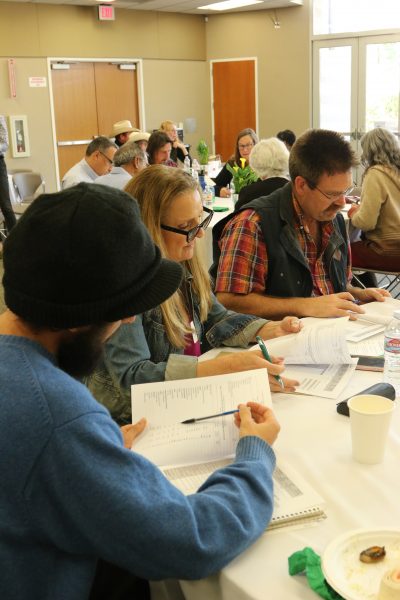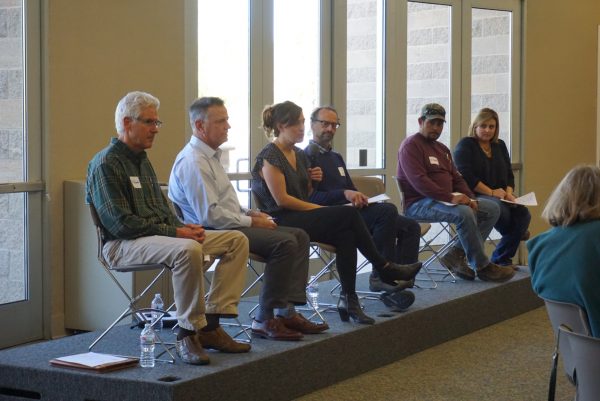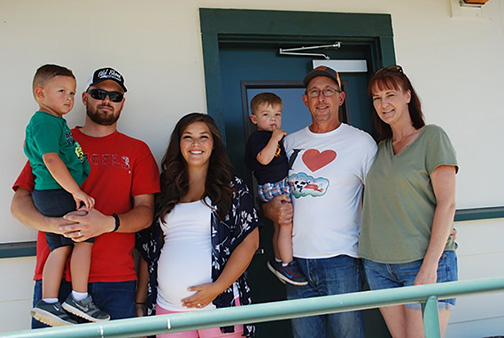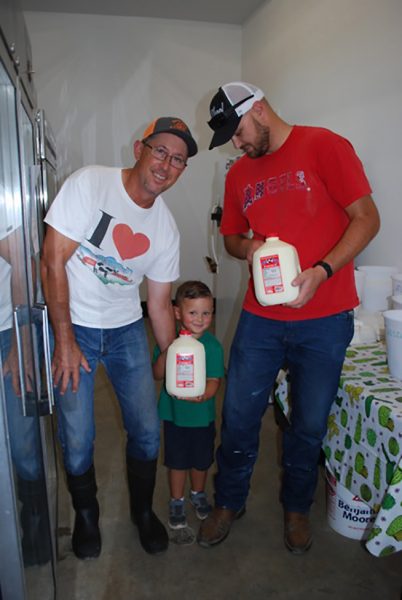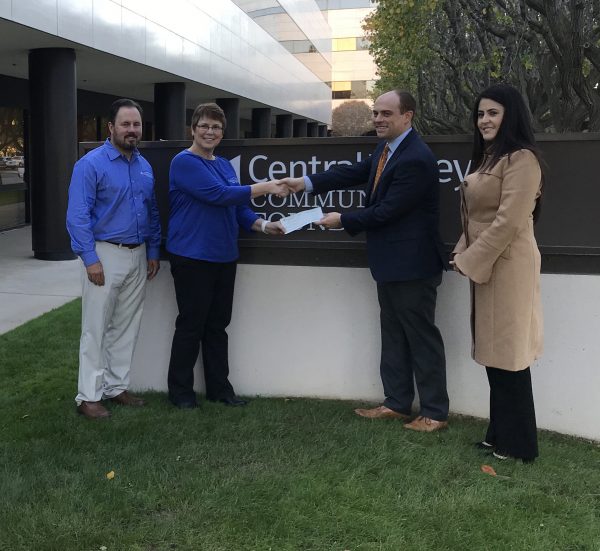Program to connect rural diabetes patients to Family Health Center, Navicent Health over high-speed internet
DENVER (January 22, 2018) – CoBank, EveryoneOn, Navicent Health and Robin Health, today announced the launch of the ConnectWell pilot program in Macon, Ga. The program, which is funded by CoBank, will provide 100 diabetic patients in rural southwest Georgia an Internet-ready tablet to enable them to manage and monitor their diabetes from home through an application, and a direct connection to physicians at Family Health Center, Navicent Health, a member of Navicent Health Physician Group, in Macon.
CoBank, a cooperative bank serving agribusinesses, rural infrastructure providers and Farm Credit associations throughout the United States, is funding the project to highlight the efficiency of universal high-speed Internet in rural areas to assist in driving down healthcare costs.
“More than 70 percent of communities in the US with a shortage to primary care doctors are in rural areas,” said Tom Halverson, president and CEO of CoBank. “Coupled with a staggering lack of access to high-speed Internet, the health of rural America is disadvantaged in comparison to their urban counterparts. This project is an important step forward as a larger proof of concept and we are proud to back it.”
“The strength of the local partnerships in Middle and Southwest Georgia sets the stage for this program’s success,” said Congressman Sanford Bishop. “Leveraging high-speed internet to bring patients closer to their doctors has the potential to dramatically improve communication and patient care. I applaud the ConnectWell pilot for bringing innovative healthcare solutions right to the hands of rural Georgians.”
“The benefits of rural high-speed internet are tremendous – not only in business and education, but also in healthcare. This pilot program will highlight how broadband can reduce costs to deliver effective and efficient healthcare here in Georgia,” said Congressman Austin Scott. “I will continue to pursue ways to close the digital divide so that 21st century opportunities and economic prosperity can come to rural America.”
ConnectWell is managed by EveryoneOn, a nonprofit that aims to eliminate the digital divide by connecting all people in America to Internet utilizing three key components; affordable, high speed home Internet service, affordable devices to use the service and top-notch literacy training.
The ConnectWell pilot program is based on a University of Mississippi Medical Center program that helped lower patient blood sugar levels, had zero hospital and emergency room remittances, enhanced the ability of patients to manage their own healthcare and, by extension, drove down costs for hospitals and patients.
The program highlights the potential of telehealth programs in rural areas and the need for rural broadband access. As agencies and organizations debate the cost of deploying rural broadband, they often overlook the life-improving efficiencies that can be gained with the access to broadband and the host of essential services, including healthcare that can be delivered.
“Navicent Health is committed to enhancing health and healthcare through access, affordability and equity of care close to home. We are pleased to join with our partners to launch the ConnectWell pilot program for the benefit of diabetic patients in our region, and look forward to replicating this program in other areas and for patients with other chronic conditions,” said Dr. Ninfa M. Saunders, President and CEO of Navicent Health.
In rural communities, low-income patients with diabetes sometimes do not get the preventative care they need. Problems that could have been resolved with routine care often spiral out of control until an emergency room visit is required. Patients are left without sufficient support or knowledge to truly take control of their own healthcare. As patients struggle to maintain their care at home, hospitals struggle to maintain costs and expenditures surrounding chronic diseases, which are often exacerbated by preventable emergency room admittances.
About CoBank
CoBank is a $124 billion cooperative bank serving vital industries across rural America. The bank provides loans, leases, export financing and other financial services to agribusinesses and rural power, water and communications providers in all 50 states. The bank also provides wholesale loans and other financial services to affiliated Farm Credit associations serving more than 70,000 farmers, ranchers and other rural borrowers in 23 states around the country.
CoBank is a member of the Farm Credit System, a nationwide network of banks and retail lending associations chartered to support the borrowing needs of U.S. agriculture, rural infrastructure and rural communities. Headquartered outside Denver, Colorado, CoBank serves customers from regional banking centers across the U.S. and also maintains an international representative office in Singapore.
For more information about CoBank, visit the bank’s web site at www.cobank.com.
About Chike Aguh, CEO of EveryoneOn
Chike Aguh (Chee-Kay Ah-Goo) serves as the CEO of EveryoneOn, a national non-profit dedicated to closing the digital divide and, to date, that has connected over 500,000 low-income Americans in 48 states to the Internet and the opportunity it brings. It aims to connect more than 1 million low-income people in total before the end of 2020. As the son of immigrants from Nigeria whose lives were changed by America’s opportunities, Chike has spent his career ensuring that all Americans have access to the same. Previously, he worked as an education policy official under Mayor Michael Bloomberg, a 2nd grade teacher and Teach For America corps member, a Fulbright Scholar in Thailand, and a Director of Corporate Strategy at the Advisory Board Company. Chike has also worked with the Massachusetts Secretary of Education, US Department of Education, McKinsey & Company, and the federal government’s Performance Improvement Council.
Chike holds degrees from Tufts University (B.A.), the Harvard Graduate School of Education (Ed.M), the Harvard Kennedy School of Government (MPA), and the University of Pennsylvania’s Wharton School (MBA). He is a 2017 Presidential Leadership Scholar, 2017 Wharton 40 under 40 honoree, term member at the Council on Foreign Relations, NationSwell Council Member, board member at Code In The Schools, member of the Harvard Kennedy School of Government’s Alumni Board of Directors, and 100 Black Men of Prince George’s County. He has spoken at venues such as the White House, SXSWEdu, Code For America and Github Universe; and been featured in or interviewed by CNN, Forbes, US News and World Report, Wired Magazine and Fast Company. Chike lives in Beltsville, MD with his wife, Crystal and son, Kelechi. They are members of Zion Church in Landover, MD.
About Navicent Health
Navicent Health was incorporated on November 17, 1994, as a nonprofit corporation whose primary purpose is to coordinate The Medical Center, Navicent Health and other affiliated entities in their mission of providing a comprehensive continuum of high quality, reasonably priced healthcare services to the region. Navicent Health has 970 beds for medical, surgical, rehabilitation and hospice purposes. The health system includes The Medical Center, Navicent Health, a nationally recognized tertiary teaching hospital; Beverly Knight Olson Children’s Hospital, Navicent Health, the region’s only dedicated pediatric hospital; Navicent Health Baldwin and Medical Center of Peach County, Navicent Health, both rural critical access hospitals; Rehabilitation Hospital, Navicent Health, the region’s oldest and most experienced rehabilitation provider; Pine Pointe, Navicent Health, which provides palliative and hospice care in homes and in its facility; Carlyle Place, Navicent Health, the area’s first continuing care retirement community; Navicent Health Foundation, the philanthropic arm of Navicent Health; as well as diagnostic and home care services. For more information, please visit www.navicenthealth.org.
About Robin Health CEO Anshu Vaish
Anshu has a deep passion for the intersection of healthcare and business and the impact it can have on patient care. Admitted to both the undergraduate and medical school programs at Brown University at 18, he pursued a degree in economics prior to medicine. During this time he also co-founded WaterWalla, a non-profit with a footprint in Indian slums and rural Sierra Leone focused on clean water, malnutrition, and maternal-child health. He also has deep experience as a strategy consultant at McKinsey & Co working across the healthcare value chain with major health systems, payors, pharmaceutical companies, and social sector organizations. Anshu is now the CEO and co-founder at Robin Health, a NYC based tech company building a next-gen patient engagement platform blending telemedicine and remote monitoring to revolutionize the current paradigm of care delivery. For more information on Robin Health, visit the company’s website at www.robinhealthapp.com







